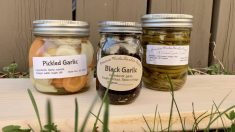Canola could be the big beneficiary of a growing movement in the European Union to ban other types of biodiesel feedstocks, says an industry executive.
On March 22, 2021, Belgium notified the European Commission of its intention to ban biofuel made from palm oil and soybean oil effective Jan. 1, 2022.
France was the first country to ban palm oil biodiesel on Jan. 1, 2020. Lithuania has also taken that step. There are reports that Germany, Italy and Denmark could soon follow suit.
Member states are getting out in front of an EU-wide ban set to be phased in by 2030.
Read Also

Ag in Motion innovation awards showcase top 2025 ag technology
The 2025 Ag in Motion Innovation Awards celebrated winners across five categories: agronomics, agtech, business solutions, environmental sustainability and equipment.
Brian Innes, vice-president of public affairs with the Canola Council of Canada, said that technically what is being proposed by the EU and its member states is not a ban.
Palm oil biodiesel could still be manufactured and sold, but it would be ineligible for biofuel programs and subsidies, which in essence means it will be pushed out of the various markets.
That represents a golden opportunity for Canada’s canola growers.
“If those measures stand they will most certainly shift demand to other oils for biodiesel production,” he said.
Canola is best poised to take advantage of that opportunity because it contains far more oil than competing crops and is already the preferred feedstock for the EU biofuel industry.
The EU biodiesel and renewable diesel sectors consumed an estimated 6.1 million tonnes of rapeseed-canola oil in 2020, according to the U.S. Department of Agriculture.
That compares to 2.4 million tonnes of palm oil and 900,000 tonnes of soybean oil.
Innes was surprised that Belgium’s proposed ban includes soybean oil.
“Belgium is the first to target soybeans,” he said.
Belgium’s ministry for the environment said the country is excluding biofuel that causes widespread deforestation and land use change, according to a report prepared by the USDA’s Foreign Agricultural Service.
Innes noted that soybeans are sustainably produced in many regions of the world, including North America and much of South America. However, there are some pockets of South America where rain forest has been converted to soybean production.
He said Belgium’s decree provides a harsh lesson about how a crop can be unfairly targeted based on impressions rather than reality and how the actions of a small group of growers can affect the livelihoods of many.
It serves as a reminder to Canada’s canola growers to ensure that their crops continue to be produced sustainably and that customers around the world fully understand and appreciate Canada’s farming practices.
Indonesia is challenging the European Union’s proposed palm oil ban at the World Trade Organization. The WTO has established a dispute settlement panel, and the case is formally underway.
Malaysia is at an earlier stage with its WTO complaint. It is in the consultation phase of the WTO dispute process, in which the two parties are attempting to resolve the dispute themselves.
The EU can still proceed with its proposed ban if it loses the WTO cases, but Indonesia and Malaysia would then have the right to retaliate by imposing trade measures against the EU equivalent to the level of damage determined by the WTO.
Contact sean.pratt@producer.com


















